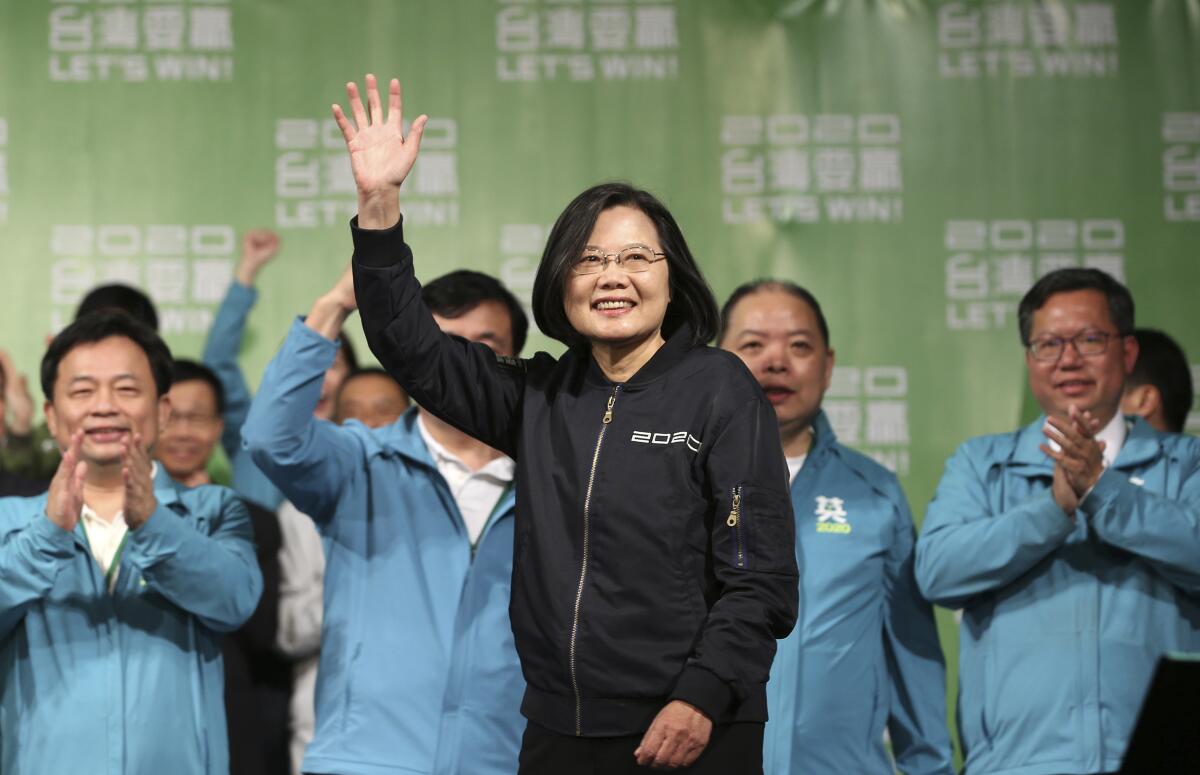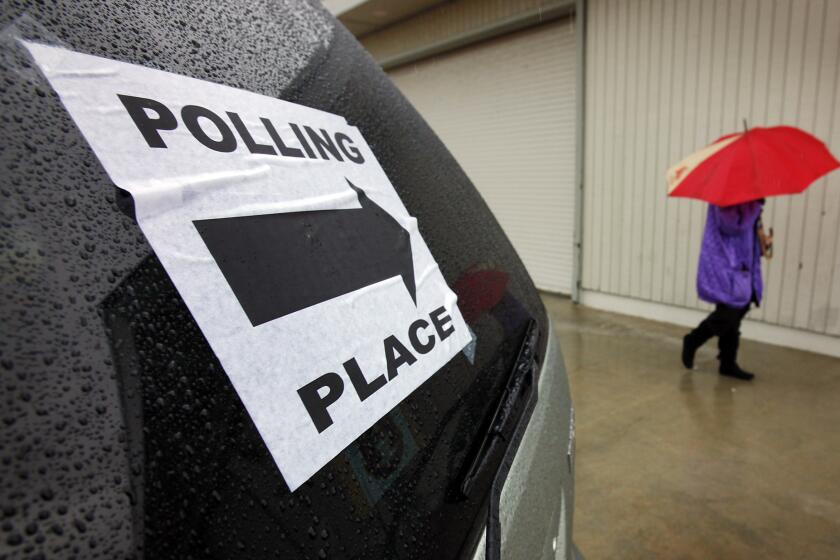Taiwan’s president sweeps to reelection, setting the stage for chilly relations with China

TAIPEI, Taiwan — Taiwanese voters handed President Tsai Ing-wen a resounding reelection victory Saturday against a more China-friendly opponent, setting the stage for another four years of heightened cross-straits tensions amid pro-democracy protests in Hong Kong and increasing authoritarianism on the mainland.
Attempts by Beijing to crack down on Taiwan, as well as a social media disinformation campaign against Tsai that appeared to originate in China, may have backfired with voters, who chose Tsai’s firm stance to defend Taiwan’s democracy against Chinese aggression over Kuomintang candidate Han Kuo-yu’s greater willingness to negotiate.
Early returns showed Tsai, of the independence-leaning Democratic Progressive Party, with 57% of the vote to 39% for Han.
In a victory speech Saturday night, Tsai said the election proved that when Taiwan’s sovereignty is threatened, its people will “shout our determination even more loudly back.”
She said she was open to discussions with China but only if a set of conditions is met, such as China abandoning its threats of force against Taiwan, each side acknowledging the other’s right to exist and Taiwan’s 23 million people having the right to decide its future.
“I also hope that the Beijing authorities understand that a democratic Taiwan and our democratically elected government will not concede to threats and intimidation,” Tsai said. “Positive cross-straits interaction, founded in mutual respect, is the best way to serve our peoples. The results of this election have made that answer crystal clear.”
As returns were still coming in, Han made a concession speech to supporters, urging unity and apologizing for disappointing them.
“Taiwan’s democracy, freedom and rule of law are our most precious assets,” said Han, the populist mayor of the southern port city of Kaohsiung. “Our fellow citizens have made this decision, and as candidates, we must respect the results of the election.”
Tsai’s party also trounced Han’s in legislative races around the island, giving her a strong majority to work with in her second and final term as Taiwan’s first female president.
Secretary of State Michael R. Pompeo in a statement congratulated Tsai and Taiwan “for once again demonstrating the strength of its robust democratic system, which — coupled with a free market economy and a vibrant civil society — makes it a model for the Indo-Pacific region and a force for good in the world.”
In more than two decades since the end of martial law, Taiwan has evolved into a full-fledged democracy. Paramount on voters’ minds has been the existential threat posed by China, which considers the island a renegade province that needs to be brought back into the fold, by force if necessary.
The presidential campaign played out with all the hallmarks of politics in the internet age, from concerns about Chinese disinformation to a deeply polarized electorate that relies on dueling media sources.
Analysts pointed to pressure from China, beginning with a hard-line speech by Chinese President Xi Jinping last January, and continuing with China’s reaction to the Hong Kong protests, as key factors in Tsai’s victory after missteps early in her term had damaged her popularity.
“They wanted a president who could handle China,” Shelley Rigger, a professor at Davidson College and a visiting researcher with National Taiwan University’s College of Social Sciences, said of Taiwanese voters.
For its part, Beijing could continue its current strategy of actively trying to undermine Tsai, take an even tougher stance or pull back, recognizing that the previous approach did not work while hoping for a more palatable candidate next time, said Kharis Templeman, program manager at Stanford’s Taiwan Democracy and Security Project.
Han had won the nomination of a major establishment party as a populist upstart with an everyman persona, stoking tremendous enthusiasm in some voters and alienating others. He rose to prominence after pulling off a stunning victory to become mayor of Kaohsiung.
A victory for Han, 62, would have brought a willingness to negotiate with China under the 1992 Consensus, which holds that there is only one China but each side can adopt its own definition of what that means.
Han and and his party have argued that closer ties with China are necessary to grow Taiwan’s economy, though they do not support the “one country, two systems” model of Hong Kong.
Under Tsai’s predecessor, Ma Ying-jeou, Taiwan signed more than 20 trade and investment deals with China, established direct air links and allowed large numbers of Chinese tourists to visit Taiwan.
Some voters may have viewed Han, who had trouble articulating his China policies and cast himself as a champion of the common man against the elite, as a loose cannon who could not to be trusted with delicate cross-strait negotiations, Templeman said.
In contrast to Han’s bombastic speaking style, Tsai, 63, rarely raises her voice. A former law professor educated in the U.S. and England, she wears her hair in a conservative bob and has made her two cats and three dogs a campaign centerpiece.
She argued that Taiwan, whose official name is the Republic of China, should look to the rest of the world rather than to China to develop alliances and trade ties.
“On Jan. 11, we can choose to compromise on the 1992 Consensus and ‘one country, two systems,’ gambling away the future of our young people, or we can choose our free democratic lifestyle, defending our sovereignty, defending the Republic of China, Taiwan,” she said at a recent presidential debate.
Since President Nixon visited China in 1972 — followed by the formal American diplomatic recognition of China in 1979 — most countries have granted recognition to China and not Taiwan, which is shut out of major international organizations like the United Nations. Taiwan split from the mainland amid civil war in 1949, when Chiang Kai-shek’s nationalists fled to the island and established a government that was initially authoritarian and eventually evolved into a democracy, holding its first presidential election in 1996.
China has struck back against Tsai by halting the flow of Chinese tourists, demanding that companies change their websites to reflect Taiwan’s subordinate status, conducting military exercises nearby and wooing away some of the island’s few remaining diplomatic allies.
Amid party infighting and a controversial attempt to reform the pension system for government workers, Tsai’s party suffered a stinging defeat in local elections in 2018, forcing her to resign as party chairwoman.
But her fortunes began to change when Chinese President Xi Jinping gave his speech a year ago emphasizing that “one country, two systems” was the only end game for Taiwan.
Taiwan’s economy has also rebounded, weakening the argument that a closer relationship with China was vital to job growth.
Last year, the DPP-controlled legislature passed a law to codify a court decision granting same-sex couples the right to marry, making Taiwan the first territory in Asia to legalize gay marriage.
Tsai gained ground by keeping her once-fractious party unified while cultivating younger voters, said Lin Chong-pin, a retired strategic studies professor from Tamkang University in Taiwan.
In the months before the election, Tsai led by more than 20 points in most public opinion polls.
With Taiwan’s democracy still young and the threat of China looming, few on the island take the right to vote for granted. In the last presidential election four years ago, a record 80% of eligible voters cast ballots.
On Saturday, people across Taiwan stood in long lines at polling places to choose legislative candidates as well as their president.
Taiwanese living overseas who traveled home to vote, including from Southern California, made up a small but enthusiastic contingent.
In Taiwan, the divide between Tsai’s DPP party , whose color is green, and Han’s KMT, represented by blue, is as profound as the United States’ Democratic-Republican divide. Younger voters are more likely to lean green and, seeing little in common between their democracy and communist China, are more likely than their elders to consider themselves Taiwanese, distinct from mainlanders, rather than Chinese.
Support for the Hong Kong protesters is also widespread here, with people posting messages on pro-democracy online bulletin boards and donating supplies, including gas masks.
But some Taiwanese say there is no immediate danger of becoming another Hong Kong, pointing to the strength of their democratic institutions.
Harris Kuo, 66, a retired teacher, favors dialogue with China but says Taiwan’s democracy has come too far for “one country, two systems” to ever be a possibility.
Kuo would not say who he was voting for but said he has supported KMT candidates in the past.
“There’s no comparison between Taiwan and Hong Kong,” he said Friday at Daan Forest Park in Taipei. “Hong Kong doesn’t have its own army. The R.O.C. has its own constitution and government. We still have diplomatic allies. We’re a sovereign state.”
Still, gradual erosion of Taiwan’s hard-won democracy remains a huge concern, especially among Tsai supporters.
Dong Yu-hsin, 23, is from the island of Kinmen, just offshore from China, which used to function primarily as a military base and was regularly shelled by Chinese troops.
He said he has supported Tsai because she will hold the line against China — a consideration that, for him, overrides any economic benefits from closer ties.
“We have such a free and open society, and on the other hand, the government in China places a lot of restrictions on its people,” said Dong, who works in the social services industry. “That’s even more important than money.”
Chang is a Times staff writer and Jennings is a special correspondent.
More to Read
Sign up for Essential California
The most important California stories and recommendations in your inbox every morning.
You may occasionally receive promotional content from the Los Angeles Times.











